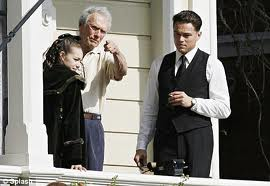When the Oscar nominations come out, it’s a sure bet that you’ll see “J. Edgar” racking up a slew of them, starting with Clint Eastwood as best director, Leonardo DiCaprio as lead actor, Armie Hammer as supporting actor and Dustin Lance Black as screenwriter for the sweeping biopic, in theaters now.
It traces Hoover’s rise as a young investigator in his 20s through his increasingly powerful perch as head of the FBI through his 70s, and chronicles the changes in America throughout those five decades.
After a pre-release screening at LACMA, the first New York Times Talk held in Los Angeles, the three principals were interviewed by the newspaper’s Charles McGrath.
“J. Edgar Hoover was the most powerful man in the 20th Century, and what a shame that we really don’t understand the man,” said Black. “It’s fascinating to me how he held onto power for nearly 50 years. He replaced love with fame and adoration in didn’t allow himself to love.”
Even though Hoover died in 1972, some of the themes in the film have particular resonance today, in the decade after 9/11. DiCaprio said the film was actually inspired by actions the Bush administration took in the war on terror.
After playing a man who delighted in bending the rules in his own favor, DiCaprio tried to sum up Hoover’s character. “He didn’t adapt with the times,” the actor said. “He equated the civil rights movement with communism, and was a political dinosaur who did deplorable things. He was eccentric, and lived with his mother until he was 40. His obsession was fighting communism, but eventually, he was proved right on that.”
In doing research for the film, DiCaprio and Black took a road trip to Washington, DC and visited Hoover’s home, the Mayflower Hotel, where he had lunch every day with trusted aide Clyde Tolson and talked to FBI agents who had worked with the men. Hammer said he had 600 pages of research and photographs to pull on for his role as Tolson.
Although the film does not depict the two men having physical relations, it makes clear the love they had for each other, dining together every day and vacationing together in Del Mar.
“Both men were men of service,” said DiCaprio. “The FBI was their church and they lived a life in the priesthood, with no families. It was a great partnership on many levels.”
As apparently was the relationship between DiCaprio and Eastwood – the first time they had worked together.” Clint relies on his own instincts without advisors and works on a gut level with an elite unit of people – and he pushes you as an actor,” said DiCaprio.
For his part, Hammer first said it was “terrifying” to work with Eastwood at the beginning.
As each man ages through five decades, their youthful looks shift and degrade with the help of a talented makeup team. For DiCaprio, it was six hours in the makeup chair and for Hammer, seven to eight hours to get the look of a man in his 70s, who at one point, also suffers a debilitating stroke.
“I was always in the old man makeup,” Eastwood joked.
Black, who won an Oscar for his “Milk” screenplay, talked about Hoover’s brilliance in using the media, both to gain power and influence for himself and for the FBI and to fan the flames of fear in the public. “That’s where it became dangerous,” he said.
Hoover started to gain national fame when gangsters and outlaws held a powerful place in the public imagination and began to shift a positive image to the good guys with films like 1935’s “G-Men,” starring James Cagney.
“Before there was an FBI, outlaws were going state to state to avoid the law,” said DiCaprio. “Hoover was a pioneer in forensics, creating a national fingerprint registry where there had been none.”
But with the social revolutions, the antiwar movement and the civil rights movement of the 60s and 70s, everything began to look frightening and different to him, and he went after people like Martin Luther King and John F. Kennedy, bugging their rooms to document their promiscuity.
When it came to sexuality, the film depicts Hoover’s frightening and powerful mother, played by Judi Dench, as having a deep impact on his by telling him, “I’d rather have a dead son then a son who is a daffodil.”
After she dies, DiCaprio as Hoover is shown trying on one of her dresses and jewelry, an allusion to rumors that he was a cross-dresser, which are never otherwise addressed.
When he is a young up-and-comer and clearly destined for greater things, as his mother has ingrained in him, Hoover is portrayed as being attracted to the woman who becomes his lifelong secretary, Miss Gandy, ably played by Naomi Watts. She rebuffs his advances– yet stays by his side until the very end– when she is shown keeping a promise and shredding his infamous personal files.
Yes, had those survived, they would probably still be held under lock and key. Eastwood, DiCaprio, Black and company have brought new insight to some sordid chapters in American history and done their best to humanize the man at the center of them.
J. Edgar, Rated R, Running Time 2:17
TAR Rating: 4.5 stars


